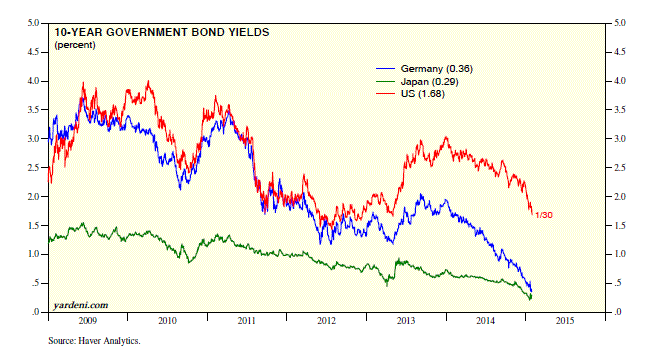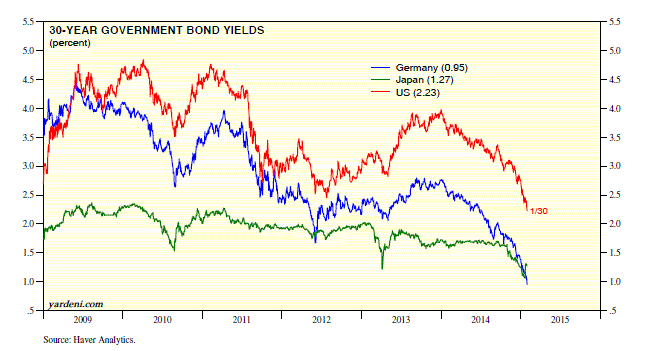
Last year, in the 5/8 Morning Briefing, I discussed nine reasons why yields were falling rather than rising, using the following headings: “Bond shortage,” “Portfolio rebalancing,” “Bond fund inflows,” “Fed still buying,” “Yields plunging in Europe,” “Inflation remains subdued,” “Global growth is slow,” “Ultra-easy monetary policy,” and “Safe Havens.” Most of these factors continue to drive yields lower. The U.S. 10-Year Treasury fell from 3.04% at the end of 2013 to 2.17% at the end of 2014. It was down to 1.68% on Friday.
At the beginning of this year, I agreed with three highly respected Bond Kings (Jeffrey Gundlach, Van Hoisington, and Lacy Hunt), who predicted that the 30-Year Treasury bond yield could fall to 2% by the end of this year. It was down to 2.25% on Friday from 3.96% at the end of 2013 and 2.75% at the end of last year. It fell below 3.00% at the start of December, racking up a very impressive gain of 17% since then!
How much lower can US bond yields go? Well, the Japanese and German 10-year government bond yields were down to 0.27% and 0.30% on Friday. The comparable 30-year government bond yields were down to 1.26% in Japan and 0.95% in Germany.
With the benefit of hindsight, Japan’s dismal economic and financial experience since the early 1990s has been a harbinger of the experience of other developed economies. Japan was first with a huge asset bubble that burst in the early 1990s. It was first to experience a “lost decade” of secular stagnation and deflation. It is now working on its third lost decade. The Japanese government was first with ultra-easy monetary policies (including NZIRP, or near-zero interest-rate policy, and QE), along with Keynesian fiscal stimulus funded with huge budget deficits, resulting in an ever-rising mountain of government debt. Japan has a rigid labor market and a big social welfare state.
The Eurozone seems to be working on its first Japanese-style lost decade. The US may not be going down the same road. However, US bond yields could continue to decline as overseas investors scramble to get better yields than the negative and near-zero ones available in Japan and the Eurozone. This is especially the case if the dollar continues to strengthen, which it will if foreigners continue to snap up US bonds.
Today's Morning Briefing: NIRP. (1) Less than zero. (2) Back to the future: Nine reasons why yields are falling. (3) Three wise men. (4) Amazingly low 30-year yields. (5) Japan blazes the trail. (6) From NZIRP to NIRP. (7) Disinflation, deflation, and stagnation. (8) ECB’s liquidity challenge. (9) Four horsemen of deflation. (10) Flight to zero. (11) China slowing. US growing. (12) Up, down, and sideways. (13) “Taken 3” (- -).

